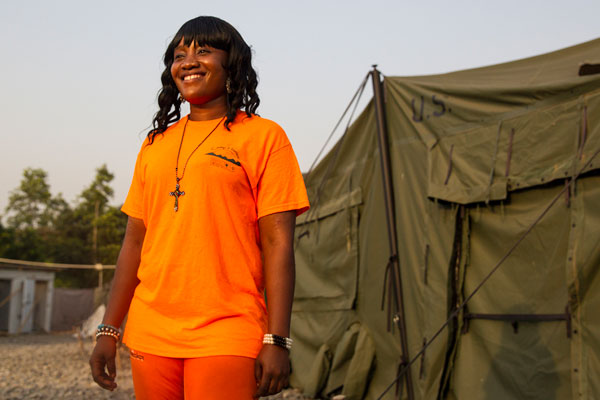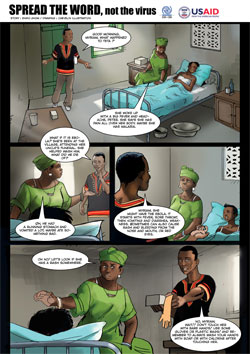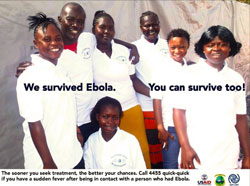
Mr Kamara, an Ebola survior working at the IOM managed National training Academy in Freetown. © Lance Steagal
After Ebola- A Survivor Builds a Stronger Sierra Leone
By Nicholas Bishop
Gibril Kamara, 38, is a survivor of the Ebola outbreak in Sierra Leone, the region’s worst affected country. Since December 2014 he has taken on a new role as a simulated patient trainer at the IOM managed National Training Academy for Frontline Ebola Practitioners in Freetown. Approximately 300 national and foreign health care workers are trained at the Academy every week by a team of 30 IOM trainers. Mr. Kamara and his fellow survivors’ work is crucial to providing a realistic training experience.
The 10 survivors, which includes Mr. Kamara, are employed as simulated patients going through different stages of the virus with foreign medical teams during practical training courses held inside of a mock Ebola Treatment Unit at the Academy. They also share their personal stories and experiences in the classroom during clinical training sessions.
Inside IOM’s National Ebola Training Academy in Freetown

Watch video here: https://youtu.be/buhi60mlWWo
Beating the Odds to Survive Ebola in Liberia
By Sandra Tumwesigye
 For 15 years Morris Sirleaf was happily married to Josephine*, the mother of his five children. Together, they ran a small shop and a farm in Suehn Mecca district’s Georgemore Town. Each week Josephine travelled to Paynesville in Monrovia, to buy goods and restock their shop. In October 2014, Morris' wife died on her way to Monrovia for treatment. She had been ill for a week.
For 15 years Morris Sirleaf was happily married to Josephine*, the mother of his five children. Together, they ran a small shop and a farm in Suehn Mecca district’s Georgemore Town. Each week Josephine travelled to Paynesville in Monrovia, to buy goods and restock their shop. In October 2014, Morris' wife died on her way to Monrovia for treatment. She had been ill for a week.
"She was very good and I had no problems with her," Morris recounts, "I never knew she had the virus so I took her body and covered her behind the house. I told her parents she had died and then the burial team came and we buried her."

Sia Tamba, an Ebola survivor from the IOM - Ebola Treatment Unit in Grand Cape Mount, Liberia. Sia works as a nurse in an IOM managed Ebola treatment unit (ETU). © Martine/UN
Meet Sia: A Health Worker and Survivor Caring for Ebola Patients
By Sandra Tumwesigye
When Sia Tamba spent days treating, feeding and bathing her friend and fellow nurse, she never expected to soon be staring death in the face. Within a few days, Sia had lost a friend and tested positive for Ebola. After two weeks of treatment, she was declared an Ebola survivor.
One of Sia’s first personal tasks as a survivor and nurse was to help other Liberians affected by Ebola. “I decided to work in the Sinje ETU because I felt that the same way health workers helped me to survive, I should deliver care so other Ebola patients can survive,” she explains. Sia, like the over 370 clinical and non-clinical staff at the three IOM-managed Ebola treatment units (ETU), received specialized training through WHO and the Ministry of Health and Social Welfare, to prepare for the role.

An IOM staffer at the border of Mali and Guinea. © UNMEER
Stopping Ebola in the Nexus of Human Mobility: Borders
By Agyedho Adwok Nyaba
Before joining IOM in October last year, I was busy travelling between Ethiopia and Kenya. My first encounter with Ebola beside the media messaging was at Jomo Kenyatta International Airport in Kenya. Upon my arrival from South Sudan, we were subjected to health screening.
“Can you please fill this form?” said the Kenyan public health official with a mask covered over his mouth before he went to record my temperature. “What is it for?” I asked. “The screening is a precautionary measure aimed at ensuring that no Ebola case gets into the country,” he replied. I complied and filled the form. There were several questions such as “Have you visited Sierra Leone, Liberia and Guinea in the last 21 days? Have you experienced any fever?” So many questions, so little time as all I wanted to do was get my visa and rush into the city. Little did I know months later, I would be working on an Ebola response programme.

Carmela Godeau, IOM’s Regional Director for West and Central Africa and Mohammed Abdiker, Director of the Department of Operations and Emergencies paid a two-day visit to Liberia to fully appreciate IOM’s Ebola response efforts within the country. © IOM/Sandra Tumwesigye 2015
Responding to Ebola Crisis Affecting Potential Movement of Populations is Our Concern
Agnès Matha interviews Carmela Godeau, IOM’s Regional Director for West and Central Africa
Why is IOM involved in the Ebola crisis?
IOM responds to crises affecting movement or potential movement of populations and the 2014 Ebola epidemic, the largest in history according to the CDC, is affecting multiple closely linked countries in West Africa. The extensive movement of people within and across the borders of Guinea, Liberia, and Sierra Leone has facilitated the rapid spread of the infection across and within the three countries. The homogeneous ethnic population that lives along the border areas has common socio-cultural activities that enhance viral transmission e.g. visiting sick relatives or attending to burial ceremonies of relatives across the border. In addition, the cross border movements have complicated tracking and follow up of contacts. The tradition that people should be buried where they were born has been a driver of cross border movements and transmission of the disease.
- After Ebola - A Survivor Builds a Stronger Sierra Leone
- Inside IOM’s National Ebola Training Academy in Freetown
- Beating the Odds to Survive Ebola in Liberia
- Meet Sia: A Health Worker and Survivor Caring for Ebola Patients
- Stopping Ebola in the Nexus of Human Mobility: Borders
- Responding to Ebola Crisis Affecting Potential Movement of Populations is Our Concern
To help West African communities fight the Ebola virus, IOM is producing a set of comics in local languages. The first in Liberian pidgin dialect explains in easy-to-understand panels how communities should react if faced with an Ebola infection. The comics are downloadable and can be printed and used freely.

The sooner you seek treatment, the better your chances.
Download Poster

Visit Blog

Getting to grips with Ebola in West Africa
Watch Video

Download Report here
- One Year On: Why Ebola is Not Yet Over in Guinea
- Ebola and HIV: How to Change Behaviour for the long term
- One Year Later, Ebola Outbreak Offers Lessons for Next Epidemic
- Ebola Crisis Brutally Exposed Failures of the Aid System, Says MSF

Download here
